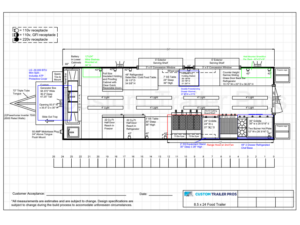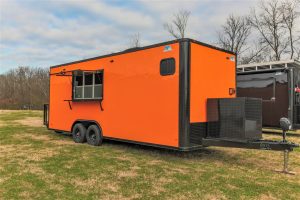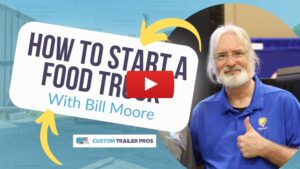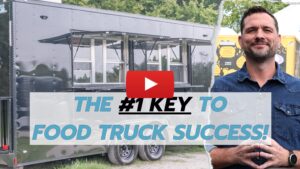HOW TO START A FOOD TRUCK
by Justin Prestidge, Owner, Custom Trailer Pros
The food truck market is a growing market with a lot of opportunity. The first step to success in this industry is having a healthy understanding of what it truly takes to operate a food truck. When people think about starting a food truck, usually the first thought is, “If my food is good, I’ll be successful.” While good food is important, it really is just the beginning. Here at Custom Trailer Pros, our mission is to help our customers become as successful as possible as quickly as possible. With that in mind, we’ve put together the following items to consider when starting a food truck. If you can execute these things at a high level your chances of success will increase dramatically. If a video is more your style, I recently sat down with the Godfather of food truck operations, Bill Moore, to hear his best tips on starting a successful food truck. For a more in-depth look at this topic, check out Bill’s book, Food Truck 101: From Beginner to Winner.
Like any business, starting a food truck will come with challenges. At some point, you are likely to face discouragement and setbacks. Being able to recall WHY you are doing this will be a helpful motivator for pushing through and overcoming the challenges that lie ahead. Share your “why” with some people close to you so they can remind you of your purpose when things get tough. While this can feel like a small thing, being able to overcome hurdles that are in your way is often times the difference between those who make it in this business and those who don’t, so keeping your motivation up during difficult times can be critical.
2. Know Your Local Codes, Rules, and Regulations
The last thing you want to do is get a food truck in your hands only to find out it is not compliant with your health codes, fire safety codes, business licensing requirements, or any other requirements you might face. This can be a tricky part of the process because regulations are different per state, county, and cities, so understanding who you’ll need to report to and what they want to see can be a challenge. Talk to other food trucks in the area to see what their experience has been, reach out to your local health department and fire marshal to understand what they’ll be looking for, and contact your city and let them know your plans. Working with your required government agencies ahead of time can help this portion of the process go surprisingly smooth, but trying to get them to pass something after the fact can go horribly wrong. We’ve heard countless horror stories of people buying used, or foreign products that are not approved ahead of time, and it ends up costing them thousands more to bring it up to code, and in many cases, it was so costly that it killed their business. Please don’t assume you’ll be fine without looking into these requirements ahead of time. This is why Custom Trailer Pros provides any needed trailer plans, specs, and schematics that are required for all of our customers. Getting those plans pre-approved will fast-track the inspection process later.
Developing your food truck menu is one of the most critical parts of the process because it will impact the food truck design, equipment needed, workflow, and total cost of the truck. Of course, you’ll want to make great food, but you will also need to make it consistently fast. There is a concept in the restaurant industry called Plates Per Minute – how long does it take to serve your food from the time it is ordered to the time you plate it and hand it to the customer? A more complex menu will likely result in longer cook times, and therefore fewer customers served per hour, whereas a smaller menu will mean lots of plates being served in a short amount of time. A larger menu will also require more storage, more cooking capacity, more prep time, and increases your risk of more food waste. All this can add up to the total starting cost being a lot higher, and cook times being a lot slower. This is why it is often the case that less is more. With this in mind, we recommend starting with a small menu that has your core items on it. Test what works and doesn’t work, see what your money makers are, and then build around that. Once your core menu is set, you can always test new menu items along the way. At the end of the day, your menu will directly impact your plate’s per minute ratio and overall profits.
Now that you know your menu, creating the best food truck design just got a lot simpler. You’ll want a design that not only includes the proper equipment needed for your menu, but you’ll want it to be arranged in a way that makes your prep, cooking, plating, and serving as fluid and efficient as possible. We recommend of thinking of each of the stages as it’s own work station, and you want the work stations set up in a way where people in the food truck will cross each other as little as possible, and you want the prep, cooking, plating, and serving to flow, in order, from one to the next. The best thing you can do at this stage is partner with a professional. Some designers just try to fit specified equipment within the food truck and call it good. A true professional designer will ensure your truck is designed to achieve maximum efficiency by understanding your menu, the equipment needed to execute your menu, and the proper workflow so that you can serve a lot of food as quickly as possible.
5. Create a Food Truck Business Plan
Now that you have an idea of what your true costs are going to be, you are ready to make a business plan. This does not have to be overly complicated. Keep your plan flexible – there will be things that come up that are unexpected, and you’ll need to respond accordingly. For a full understanding on what your plan should include, we recommend working with Bill Moore to learn what this would look like in detail. At the very least, your plan needs to include:
- Projection of sales
- Projection of expenses
- Marketing Plan
- Free Marketing
- Paid Marketing
- Location(s)
- Hours of Operations
- Operational Contacts
- Suppliers
- Health and Fire Safety Officials
- Vehicle Repair Contacts
- Equipment Repair
- Insurance
- Legal Aid
- Other trusted operators
- Employees
- Break even budget
- Etc.
Financing is an integral part of the starting process for all food truck owners. It’s easy to assume this process is similar to financing a car, but it is much more complex than that in reality. The obvious first step is determining the cost of the food truck, but you will also want to consider the total start-up cost and operating expenses of the business, such as taxes, fees, food, gas, cooking needs, employees, and insurance. Depending on your financial situation, you might want to explore a whole business start-up loan, or if you have some operating capital, you might only need to finance the food truck itself. Once you determine the amount of capital needed, you can begin looking at different options to achieve financing such as local banks, an SBA loan, national lenders or investors. If you operate an existing food business, this can sometimes give you a head start with lenders. Startup financing can be a long process and more difficult to acquire because ultimately, there is much more to it than just buying your food truck. This stage in the startup tends to sober up entrepreneurs, making it essential to consider early in the process.
7. Food Truck Location
Now it is time to consider your location strategy. You will need to decide on a model that fits your operation style. For example, you can have a mobile, permanent, semi-permanent, or catering style operation. You may also desire to have a combination of multiple functions. Ultimately your location will directly impact your model of operations.
Establishing partnerships with local businesses can be extremely beneficial to set up ahead of time. This can include:
- Retail Shops
- Food Truck Parks
- Breweries
- Factories
- Office Centers
- Hospitals
- Gas Stations
- and more
Outside of that, there might be high traffic areas that are lacking food options as well, such as parking lots, highway exits, and we’ve seen a lot of our customers have success in small towns that have very limited food options. Local partnerships can take your business a long way and can help you establish a consistent operating schedule. If your customers know where you will be on any given day, it will make repeat business a lot easier. Large events such as fairs, carnivals, and concerts can be good money makers as well, if managed correctly. Another option that has grown in popularity is turning your food truck into a drive-thru. Something else to keep in mind is you will want to research the protocol for whatever locations you settle on. Things like local noise ordinance laws and other local protocols can affect your operation, making it essential to do your research beforehand. Overall, you will want to have multiple location strategies on deck.

After you’ve mapped out your food truck concept, it’s time to think about how you will power your mobile business. Typically you can use generator power or shore power (an electrical plug that draws power from a permanent source). Food trucks are commonly powered by generators, and there are many different types of generators in the market. You will need to consider the equipment inside and conduct an electrical audit to determine what power level you will need when deciding what generator you will purchase. Essentially, you will have to choose between three types of generators: traditional portable generators (loud construction site type generators), inverter quiet portable generators (much quieter, more expensive, but also not quite as powerful) or in-line generators (quiet, directly wired into the food truck, most expensive solution). This is important to consider when buying your generator because you will need to understand how the sound produced from the machine will affect your business. Another factor to consider when purchasing is storing and securing your generator, so you will want to keep size in mind. Even when considering a permanent operating style, it is always good to own one. Generators are very valuable and provide the ability to power your truck and all the equipment inside on your own, allowing you to take your business to any location without power limitations. This is such a large topic in the food truck world, and it is therefor discussed at length by operators in online forums. To see what people are saying in the Food Truck Training Facebook Group, just go HERE!
Your food truck will be your largest asset, so it is extremely important to get this portion of your process correct. An essential part of the buying process is finding a qualified provider and making sure it’s someone you can trust and work well with. I know how that sounds coming from a food trailer dealer, but I started this company in 2012 with a desire to empower people to get their dreams rolling. There are all kinds of dealers out there, and with that comes all different levels of expertise, craftsmanship, build-times, and service. Like most industries, there are bad apples out there too – ranging from some who aren’t very good at their jobs, to those who are outright scamming hopefully buyers out of thousands of dollars. Reading reviews and getting referrals can be a great start, but there are several other things you can do to ensure you don’t get ripped off. This process is not like buying a car; you are partnering with a dealer to custom design and build a food truck that meets your exact needs. Understanding build times and the time it takes to get the truck operational once you receive it (average of 30 days), is crucial. On top of that, the right dealer can help connect you to the right financing partners, and other industry experts as needed. Therefore, working with a dealer who is honest and upfront about the process from start to finish is huge. Once you get your build time and make your deposits, you are on your way to being up and operating!
10. How to Run a Food Truck

Finally, you have thought about everything you need to start your food truck. The only thing left to do is figure out how to run your food truck. There are many variables that will go into running your food truck – too many to cover here. However, getting plugged into your local food truck community can be a great resource for you. In addition to that, social media has been a tremendous resource for many of our customers. Food truck owner community pages can provide helpful insights from those with experience, and there is opportunity to ask questions to the groups that are specific to your needs. Our favorite community page is Food Truck Training. Other important things to figure out are how to source your food and supply, location picking, and social media strategy. From there, you can determine your ordering and pickup strategy and consider will you need other things like a pager or awnings. Places you can store, dump, and fill your water supply are also crucial aspects of the process to determine as well. As the seasons change, you might need to plan to winterize your trailer. All of this and so much more will go into running your food truck. Once you are up and running, all the work you have put in up until this point will have set you up for smooth sailing.
Next Steps
Thank you so much for reading through this guide. We genuinely hope you found it helpful. An investment in yourself is one always worth making.
Now that you have thought through these steps, what questions do you have? We’d love to connect and help any way possible. Here are some ways to stay in touch:
- Call: 800-859-5405
- Email: info@customtrailerpros.com
- Facebook (A great place to read reviews)
- YouTube – We are constantly adding resourceful content to help people in the food truck industry achieve success.
- Request a Quote for your dream trailer
- Shop our trailers
Happy trucking!
WHY CHOOSE US?
We include many standard features that others will charge you extra for.
-
- Professional designs with industry experts
-
- Built-to-order trailers made for your exact needs
-
- Standard trailer features at no additional price:
-
- .080 Exterior Thickness Aluminum (compared to .024)
-
- Large Capacity 3-Bay Sinks with Drainboards
-
- 60″ Triple Tube Tongue
-
- Complete Electrical Package with 25′ Power Cord and 50Amp Plug.
-
- All LED lighting inside and out
-
- Insulated Walls and Ceiling
-
- 7’6″ Interior Height



